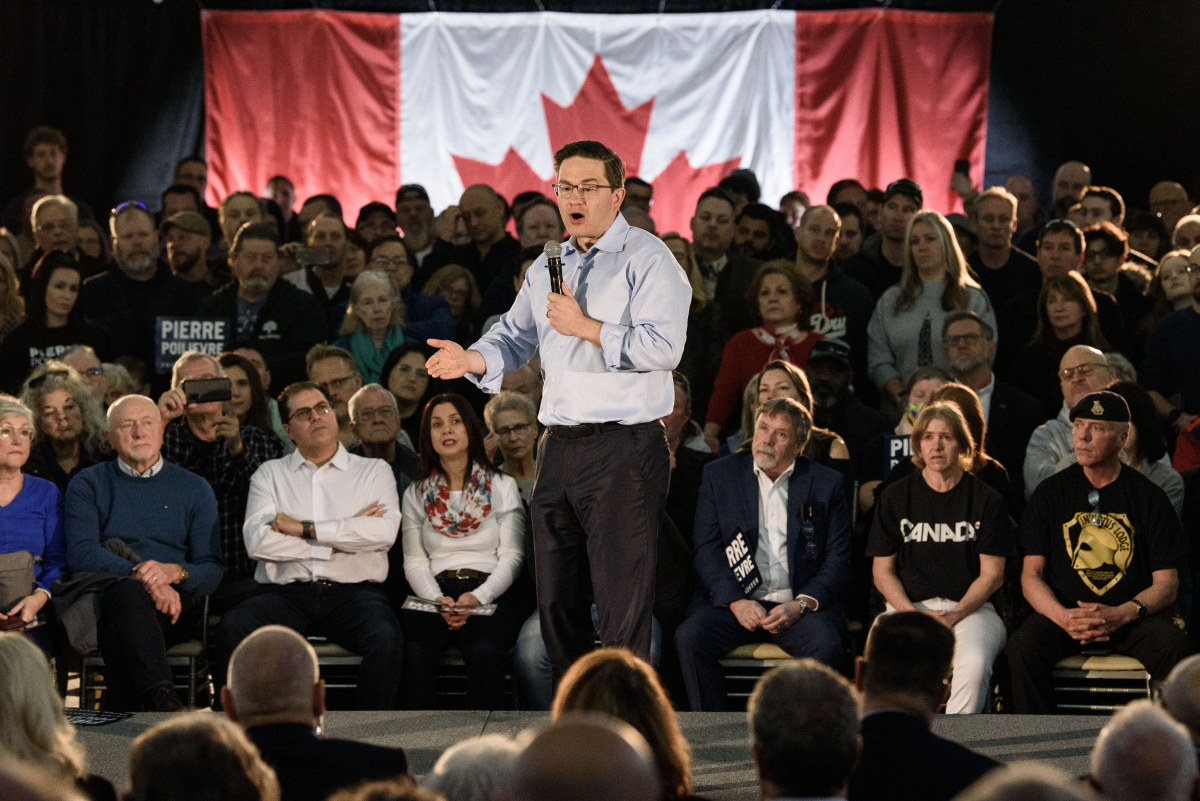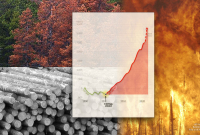Support strong Canadian climate journalism for 2025
Federal Conservative Leader Pierre Poilievre has cancelled a handful of upcoming events, often billed as anti-carbon tax rallies, in B.C. and Yukon as this year’s historically wildfire season tears through communities.
“Due to the seriousness of the situation,” Poilievre is postponing his upcoming tour of B.C., Sebastian Skamski, Poilievre’s director of media relations, said in a statement posted today. “Our priorities are to support British Columbians fighting these devastating wildfires,” reads the statement.
The Opposition leader was supposed to appear this evening in Campbell River, B.C., for one of his “Bring it Home” rallies, which have repeatedly called on Ottawa to axe the carbon tax, as well as focusing on inflation and housing. Terrace, B.C., was his next scheduled stop on Aug. 23, and Yukon on Aug. 24.
All three have been postponed.
“Due to severe wildfires, and the devastation and disruption they are causing to those affected by emergency evacuation orders, we have made the decision to cancel planned events and postpone them to a future date,” reads an online update for the Yukon rally.
Former federal environment minister Catherine McKenna posted a screenshot of an email telling Conservative party supporters the Yukon “Axe the Tax” rally is postponed until further notice.
“As fires burn and Canadians are displaced across the country, Pierre Poilievre is touring the country saying we don't need real climate action,” said federal Natural Resources Minister Jonathan Wilkinson in a Aug. 20 Tweet.
“This isn't the leadership that Canadians want. It’s shameful.”
Climate change — driven primarily by the burning of fossil fuels like coal, oil and gas — is a key factor in increasing wildfire risk. Climate change is bringing more storms and lightning strikes that start fires, hot conditions dry up organic matter into perfect forest fire fuel and arid, windy weather fans the flames.
The federal carbon price creates a financial incentive for businesses and individuals to pollute less by putting a price on each tonne of carbon dioxide, or equivalent greenhouse gases, emitted when fossil fuels are consumed.
“We are still waiting for any kind of climate plan from Pierre Poilievre,” said Environment and Climate Change Minister Steven Guilbeault in an emailed statement to Canada’s National Observer. “While the Conservative party still debates whether climate change is real, the world is on fire,” the statement reads.
“Mr. Poilievre is forced to cancel events due to climate-fuelled catastrophes but he still can’t bring himself to face reality,” said Guilbeault, adding that putting a price on pollution is a key part of the federal government’s plan to “build a country with sustainable jobs, strong communities and thriving natural beauty.”
Poilievre’s team did not respond to requests for comment by publication time.
One of Poilievre’s most common talking points is that he will axe Trudeau’s carbon tax if he becomes prime minister. He hammers the carbon price at every opportunity, tying it to the affordability crisis and telling Canadians eliminating it will lower prices.
More frequent storms, extreme weather and heat waves made worse by climate change are capable of causing billions of dollars worth of damage to infrastructure. The cost of rebuilding B.C. after the historic 2021 floods is near $9 billion, according to analysis done by the Globe and Mail.
In 2021, the Canadian Climate Institute found health impacts from climate change could cost Canada's health-care system billions of dollars and the economy to the tune of tens of billions in coming decades. Shortly after those findings were published, Western Canada experienced an extreme heat wave that killed 619 people between June 25 and July 1, according to the BC Coroners Service.
Natasha Bulowski / Local Journalism Initiative / Canada’s National Observer






Comments
Wait six months. Rural Canadians will welcome "axe-the-tax" Poilievre with open arms. While blaming Trudeau for the loss of homes and businesses.
The Liberals would be wise to hold the next election in mid-summer during wildfire season.
Election ad campaign idea #1:
Post Poilievre's image talking about axing the carbon tax and wheeling around having a clear response to climate change on top of a green screen backdrop of multiple news clips of forest fires across Canada.
"...wheedling..."
Election campaign ad idea #2:
Post Poilivre's image with his anti-carbon tax, anti-environment and pro law & order comments on a green screen backdrop of the convoy truckers and open fires belching smoke, blaring their klaxons and causing mayhem with a grinning Pierre shaking their hands and hugging them. Remind the public that a $300 million class action lawsuit on the damage caused by the convoy is underway.
Poilievre is so out of touch with reality when it comes to climate change, you kind of wonder what people see in this Wana bee PM failure. Conservatives have no interest in climate change as it goes against their love affair with oil & gas. On top of that, they really don't have any policies related to climate change other than stirring up the base through social media and pushing it as a hoax. We all know the Pierre and the CPC are using 3rd parties to quietly push their nonsense to the naive base and free-dumbers, even though they won't admit it.
It seems the conservatives are fine with the floods, wild-fires and anything else being driven by climate change, as long as it doesn't upset their oil and gas cart. Their hopes are they won't be around long enough to enjoy the mess future generations will inherit.
Artificial Intelligence response to climate change denialism. A number of the reasons below fit the conservative mindset, like #1, #8 and possibly #9.
Climate change denial, or the refusal to accept the scientific consensus that climate change is primarily caused by human activity, is multifaceted. There's no single reason why all deniers reject the consensus; instead, there are various reasons that can be grouped into several categories:
1. **Economic Interests**: Some industries, particularly those related to fossil fuels, stand to lose a significant amount of money if governments take action to reduce carbon emissions. There's a history of some entities funding climate denial campaigns to protect their interests.
2. **Political Beliefs**: In some countries, especially the U.S., climate change has become a highly partisan issue. Many conservatives view climate change policy proposals (like the Green New Deal) as a ploy to increase governmental control and regulation.
3. **Perceived Threat to Personal Freedom**: There's a subset of people who view any government intervention or regulation as a threat to personal freedoms. For them, climate change measures are seen as another instance of government overreach.
4. **Scientific Skepticism or Misunderstanding**: Some people genuinely believe that the science isn't settled on climate change. They may feel that climate is always changing naturally and that current changes are not primarily caused by human actions. Some might misunderstand or mistrust the data or models used in climate science.
5. **Media Influence**: Certain media outlets and personalities promote climate change denial. Their viewers and readers may adopt these viewpoints based on trust in these sources.
6. **Perceived Economic Burden**: Some people fear that transitioning away from fossil fuels will be expensive, leading to job losses in certain sectors and higher energy costs.
7. **Cultural and Identity Reasons**: In some contexts, denying climate change becomes a part of a group's identity, with social pressures to conform to the group's dominant beliefs.
8. **Short-term Thinking**: Some people prioritize immediate concerns over long-term risks. For them, the potential future impacts of climate change might seem abstract or less pressing than other present-day concerns.
9. **Religious Beliefs**: Some people believe that humans don't have the power to change the climate or that a divine power would not allow us to destroy the Earth.
10. **Conspiracy Theories**: There are those who believe that climate change is a hoax created for various nefarious purposes, such as a ploy to funnel money into certain industries or as a way for scientists to receive funding.
11. **Lack of Awareness or Education**: Some individuals might not be aware of the consensus among climate scientists or might not have had access to comprehensive education on the topic.
It's essential to engage with people with empathy and understanding, recognizing that their beliefs are influenced by a complex web of factors. Finding common ground and communicating the science in a clear, relatable manner can help bridge the divide.
Just to be clear, ChatGPT et al. are not "artificial intelligence"--they are a technology that developed from a broad FIELD of computing called "artificial intelligence". And that isn't really the Chatbot's response, it was scraped from stuff written by various actual people on the web.
Sorry, the whole "AI" phenom makes me grumpy; it's pretty cool and clever in itself even if it don't match the hype, but seems like it's mostly going to get used to screw things up, so I'm finding myself wishing it had never been developed.
This just again shows how out of touch Poilievre is with reality and common sense. Really- preaching against any measure that will reduce pollution and our emissions is insane. I really hope that people remember this come voting time. Totally insane.
I think it would be wise not to underestimate how much traction Poilievre is getting with many Canadians. His tactics and dismissive attitude regarding Climate Change are shameful, but polls suggest he's significantly ahead of the Liberals.
Please write letters to your MP's and local newspapers and try to set the record straight. Point out the links between wildfires and Climate Change. And the costs to our Health Care System, Emergency Management agencies, infrastructure etc.
We REALLY need media reform in this country (this world, really). Imagine the mainstream papers took climate change as seriously as, well, the National Observer. No political party dabbling in denialism could have the faintest hope of success.
Funny how the Conservatives always avoid admitting the federal carbon tax is revenue neutral, has a reimbursement function and is not applicable in provinces with their own CT.